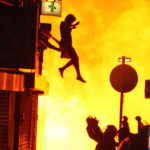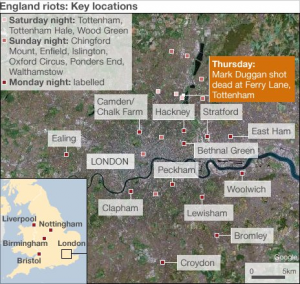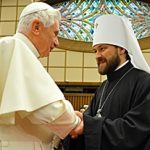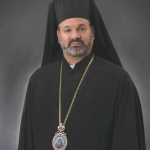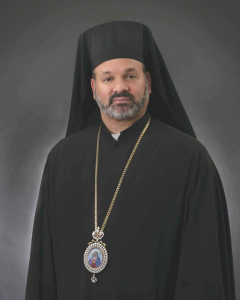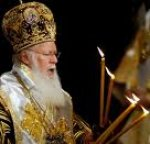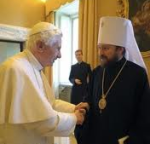
Deprecated: trim(): Passing null to parameter #1 ($string) of type string is deprecated in /home/aoiusa/public_html/wp-content/plugins/sexybookmarks/public.php on line 388
Deprecated: trim(): Passing null to parameter #1 ($string) of type string is deprecated in /home/aoiusa/public_html/wp-content/plugins/sexybookmarks/public.php on line 394
Deprecated: trim(): Passing null to parameter #1 ($string) of type string is deprecated in /home/aoiusa/public_html/wp-content/plugins/sexybookmarks/public.php on line 400
Source: Inside Vatican
The end of state atheism in Russia in 1991 and the return to Christian faith in that country, at least in a modest way, in the years since — opinions on the extent of Russia’s religious renewal are sharply divided — seemed something impossible in the 1960s, 1970, 1980s…
Pope John Paul II fervently desired that change so that Europe might regain its spiritual health and “breathe with two lungs” — Eastern as well as Western, Greek as well as Latin, Orthodox as well as Catholic… despite all the centuries of division and mistrust since the “Great Schism” of 1054.
In the long process of this new “breathing” a special moment occurred on September 29 at Castel Gandolfo outside of Rome.
On the morning of September 29, Benedict XVI welcomed the Orthodox Metropolitan Hilarion of Volokolamsk, head of the Patriarchate of Moscow’s Department for External Church Relations — the equivalent of the “Foreign Minister” of the Russian Orthodox Church (photo above).
It was the third meeting between the Pope and the Metropolitan, following Hilarion’s election as the Department’s leader.
Hilarion gave Benedict as a gift an icon of St. Benedict of Norcia, who is of course Pope Benedict’s patron saint (because the Pope’s name is Benedict), and the Pope received the icon with pleasure.
Here is a video which shows the Pope meeting with Hialrion and greeting his entourage. It is worth the 60 seconds it takes to view it:
During his visit to Rome on September 28, Hilarion met with Cardinal President Kurt Koch at the Pontifical Council for Promoting Christian Unity, to discuss the future of cooperation between the Catholic and Orthodox Churches.
During the meeting, “the protection of Christians and the overcoming of Christianophobia” were discussed.
Obstacles remain
After the meeting with Pope Benedict, Hilarion gave an interview to Vatican Radio where he outlined some of the problems that continue to remain preventing the full reunion of the Orthodox and Catholic Churches — the “two lungs” which Pope John Paul hoped would soon “breathe together.”
One problem is that the Orthodox themselves are divided into 16 different Churches, and have not settled certain internal questions of authority.
One special date to note: May 2013, when celebrations are scheduled recalling the end of the decades of terrible persecution of Christianity in the Roman Empire 1,700 years ago. In 313, the Emperor Constantine issued his “Edict of Milan” declaring the Christian faith legal in the Roman Empire. (There were no more Roman governmental persecutions after that, except briefly under the rule of Julian the Apostate in 360 A.D.)
The Orthodox are planning a great gathering in 2013 in Nis, Serbia, to commemorate the Edict of Milan, because Nis is the birthplace of the Emperor Constantine.
And there is some talk — not confirmed — that the Orthodox may invite Pope Benedict to attend that celebration, which would then become the first meeting ever between a Roman Pope and a Russian Orthodox Patriarch.
This would be a symbolic moment, in a world which is turning once again against Christianity, with legal restrictions against the teachings of the faith rising in the West, and persecutions occurring in various places around the world.
So let’s keep watch for developments on this front.
Here is a news story which summarizes Hilarion’s remarks. I have bold-faced a paragraph at the end which mentions the Nis meeting in 2013.

Source: Catholic News Agency | Benjamin Mann
Orthodox archbishop: we’re internally divided on question of “primacy”
Castel Gandolfo, Italy, Sep 30, 2011 / 12:51 am (CNA).- A leading Russian Orthodox official says the Eastern Orthodox churches have yet to resolve the question of authority among themselves, a condition for future progress on the issue of the papacy.
“I would say that there are certain divergences, and there are different positions, of the Orthodox churches on the question of the primacy,” said Metropolitan Archbishop Hilarion Alfeyev of Volokolamsk, head of the Moscow Patriarchate Department for External Church Relations, in a Vatican Radio interview following his Sept. 29 meeting with Pope Benedict XVI at Castel Gandolfo.
“As we discuss the primacy of the Bishop of Rome, within the framework of the next commission, we do not only discuss the primacy of Rome; but we have to touch the issue of the primacy in general,” noted the Orthodox metropolitan, apparently referring to future proceedings of the Joint International Commission for Theological Dialogue Between the Catholic Church and the Orthodox Church.
“And here, of course, we have different traditions – not only between the Catholics and the Orthodox, because we never had such a centralized system as the Catholics have – but we also have some difference among the Orthodox, as to what should be the role of the ‘first hierarch’ in the Orthodox Church.” The Patriarch of Constantinople occupies that role, but his prerogatives are not fully defined.
Metropolitan Hilarion was scheduled to participate in the last session of the Catholic-Orthodox commission, held in 2007 to discuss the question of papal primacy. But an internal dispute between Constantinople and Moscow, over an Orthodox group in Estonia, prompted the Russian representative to walk out. The two churches also dispute the status of the Orthodox Church in America.
On Thursday, the metropolitan made an apparent reference to these types of difficulties between the Patriarchs of Moscow and Constantinople, saying that “if a particular Orthodox church will want to impose its own vision of this primacy on other churches, then of course we will encounter difficulties. And this is what is happening at the moment.”
Meanwhile, the world’s local self-governing Orthodox churches are also attempting to organize a historic Pan-Orthodox Council, comparable to the Church councils held in the Byzantine empire during the first millennium.
The new gathering has been in preparation for 50 years, as the Orthodox world seeks to determine how the Patriarch of Constantinople should exercise his authority.
“We believe that his role should be the primacy of honor, and also he is afforded some coordinating role: for example, he can convene the Pan-Orthodox Council,” said Archbishop Hilarion. “Of course, previously – in the history of the ecumenical councils – it was not the Patriarch of Constantinople, neither was it the Pope of Rome, but it was the (Byzantine) Emperor, who convened the councils.”
“So we have this model (of primacy), which is emerging in the Orthodox tradition. But generally, for centuries we had a very decentalized administration. Each autocephalous church is fully independent from other churches in its self-governance. And therefore we do not have a very clear picture as to what should be the role of the primate in the Orthodox tradition.”
“Without having this clear and unified vision, we cannot easily discuss the issue of how we see the role of the ‘Primus Inter Pares’ (‘first among equals,’ an Orthodox concept of the papacy) in the universal Church,” Metropolitan Hilarion admitted.
The phrase “first among equals” signifies the typical Orthodox view of the Pope as having a primacy of honor but not jurisdiction. In his 2010 book Light of the World, Pope Benedict said the “first among equals” view of the Pope was “not exactly the formula that we believe as Catholics,” due to the Pope’s “specific functions and tasks.”
Until Orthodoxy clarifies its own systems of authority, Archbishop Hilarion said, hopes for progress on the question of the papacy between Catholics and Orthodox are “probably not too high.”
“But still, there is hope, because if there is willingness to accommodate different positions and to produce a paper – or several papers, maybe – which would clearly state the differences, which would outline the way forward, then we can progress.”
The Moscow Patriarchate’s ecumenical representative also expressed hesitation about a possible meeting between the Pope and the Patriarch of Moscow, which has never occurred in the centuries since Moscow’s elevation to patriarchal status in 1589.
There are hopes that such a meeting could take place in 2013, on the 1,700th anniversary of Christianity’s legalization by the Emperor Constantine. But Archbishop Hilarion said Catholics and Russian Orthodox believers should not jump to conclusions about when a meeting may occur between the Pope and the Patriarch of Moscow.
“We believe that such a meeting will take place at some time in the future. We are not yet ready to discuss the date, or the place, or the protocol of such a meeting – because what matters for us, primarily, is the content of this meeting.
“As soon as we agree on the content, on the points on which we still disagree or have divergent opinions, then I believe we can have this meeting. But it requires a very careful preparation, and we should not be hurrying up, and we should not be pressed to have this meeting at a particular point of time.”
Despite his cautious attitude toward this meeting and other ecumenical matters, Metropolitan Hilarion spoke warmly of Pope Benedict XVI himself.
During his recent trip to Germany, the Pope met with representatives of the Orthodox churches in the country, and spoke of a “common engagement” among Christians to ensure that “the human person is given the respect which is his due.”
“His Holiness is a man of faith and whenever I meet with him I’m encouraged by his spirit, his courage and his dedication to the life of the Church worldwide,” Metropolitan Hilarion said after his meeting with the Pope on Thursday.
“Of course I’m very impressed by his knowledge of the Orthodox tradition and the attention he pays to the dialogue between the Catholics and the Orthodox… I believe that this attitude of the Primate of the Roman Catholic Church will greatly help us in our way towards better mutual understanding.”
(Here is a link to the article: http://www.catholicnewsagency.com/news/orthodox-archbishop-were-internally-divided-on-question-of-primacy/)

